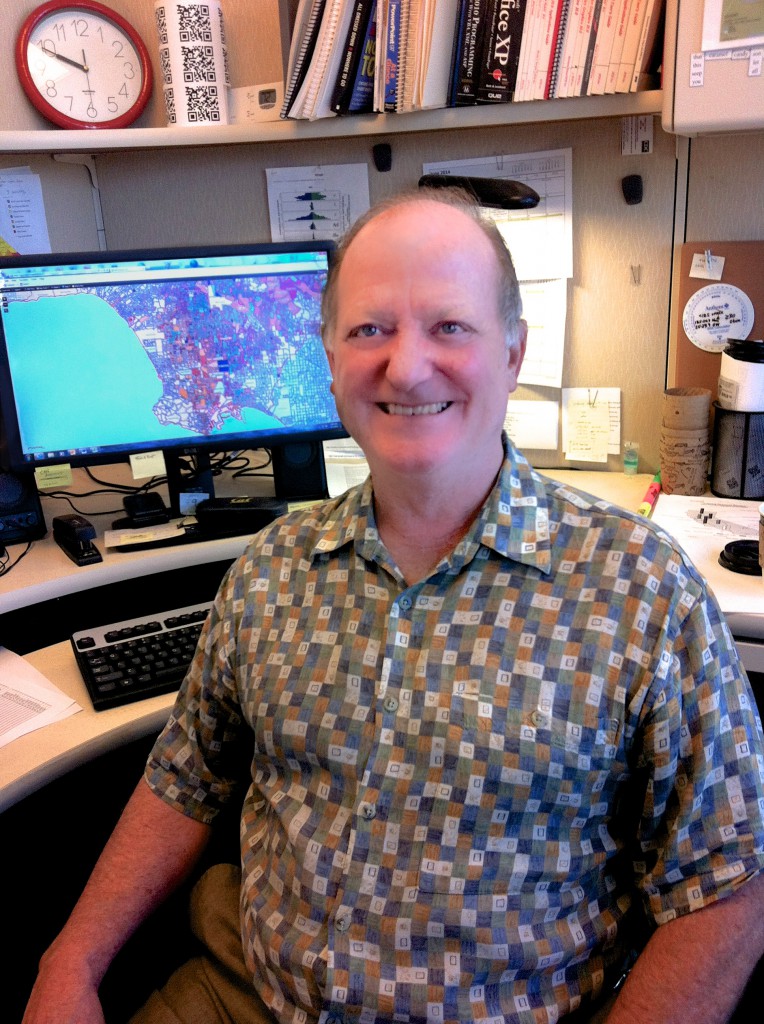“Eat your fruits and vegetables!”
Growing up, you probably heard that line more times than you can count, and with good reason. Fruits and vegetables are the cornerstone of a healthy diet as outlined by countless state and federal nutrition programs, including the Michelle Obama-spearheaded “Let’s Move” campaign and the California Department of Public Health’s (CDPH) “Network for a Healthy California” initiative.

California State University, Dominguez Hills alumnus Patrick Mitchell (M.A., Class of 1980, applied behavioral science) knows that better than anyone else. He’s among the primary research scientists at the CDPH working to improve nutrition among low-income California residents, with a focus on children.
A self-described biostatistician, Mitchell examines current nutrition and physical activity levels of Californians and makes computer-generated models to connect how income and education levels may be impacting their health.
Specifically, he’s worked on projects that track how often fruits and vegetables are a part of everyday diets in the Golden State and how and why those trends may have changed over the past few years. He and his colleagues have found that a shift away from home-cooked meals, less walking and bigger portion sizes have contributed to a disturbing trend.
According to the federal “Let’s Move” campaign, the obesity rate among children has tripled over the past 30 years, and their life expectancy is now less than their parents. The numbers are especially alarming in the Hispanic and African American communities, where nearly 40 percent of children are either overweight or obese. At the going rate, one third of all children born in and after the year 2000 will suffer from illnesses such as diabetes, heart disease, asthma and high blood pressure.
Those alarming figures inspired Mitchell’s research, which in turn spurred the “Champions for Change” television ads that air in Los Angeles to encourage healthy eating and regular physical exercise. A corresponding website offers healthy recipes and tips on nutrition and physical activity that is tailored for food stamp recipients.
 Mitchell has also written countless articles and briefs on a variety of other health-related subjects including the effects of sugar-sweetened beverages, physical activity among childbearing women, and alcohol consumption and tobacco use trends.
Mitchell has also written countless articles and briefs on a variety of other health-related subjects including the effects of sugar-sweetened beverages, physical activity among childbearing women, and alcohol consumption and tobacco use trends.
“I’ve always worked for projects that attempt to modify mass behavior to improve health,” he said.
Mitchell, who after earning his M.A. at Dominguez Hills, received his doctorate in public health with an emphasis in behavioral science from UC Berkeley, credits his extensive education for giving him the theoretical framework to tackle issues like childhood obesity.
“I’m right at home combining the fields of psychology, sociology and anthropology,” he said. He uses theories from each field to identify problems and come up with culturally sensitive solutions and targeted programs that could help curb the high rates of junk food consumption among low-income residents.
Most recently, Mitchell has been involved in designing studies evaluating whether those solutions–television ads and direct education taught in schools–were effective in changing the eating habits of children from various cultural backgrounds.
Much of his cultural sensitivity comes from his time at CSU Dominguez Hills, where Mitchell was not only a student, but taught a summer computer camp in 1985. The first week, he and his students built a Timex-Sinclair microcomputer and in the second week, he taught them how to program it.
He credits the university’s unique emphasis on practical knowledge as a highlight of his time here, saying he often had access to then-cutting edge technology that spiked his interests in statistics and research.
“I got to put my hands on an electron microscope and a bread boarded micro-computer just for fun,” he said.
In addition to hands-on learning, Mitchell also emphasized that CSU Dominguez Hills’ “wonderful and tremendous diversity” helped him build the tools to better understand problems facing low-income Californians and how to create solutions tailored to their needs.
“There is a celebration of the social glue by design [at CSU Dominguez Hills],” he said. “It really makes me appreciate the amazing people in our state.”